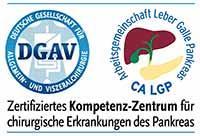Peritoneal Carcinomatosis With Ascites — Intraperitoneal Immunotherapy With Catumaxomab: treatment in the Best Hospitals of Germany
Treatment prices are regulated by national law of the corresponding countries, but can also include additional hospital coefficients. In order to receive the individual cost calculation, please send us the request and medical records.

Department of General, Abdominal, Transplant, Hepatopancreatobiliary, Colorectal, Endocrine, Bariatric Surgery and Hernia Surgery
The Department of General, Abdominal, Transplant, Hepatopancreatobiliary, Colorectal, Endocrine, Bariatric Surgery and Hernia Surgery provides the full range of services in the areas of its specialization and holds a leading position at the national and international levels in terms of the number of surgical interventions performed and their success. Of particular interest are operations for treating diseases of the bowel, stomach, esophagus, pancreas, liver, gallbladder, and bile ducts, and endocrine glands. The department's doctors have excellent skills in the surgical treatment of cancer, surgery for liver, kidney, pancreas, and small intestine transplants, and operations for morbid obesity. The department's operating rooms are the pride of the medical facility, since they have all the necessary technical options for performing operations with the da Vinci surgical system, image-guided interventions, and endoscopic surgical procedures, which are characterized by minimal trauma rates.







Department of General and Abdominal Surgery, Hepatopancreatobiliary Surgery, Colorectal Surgery, Endocrine Surgery, Hernia Surgery and Bariatric Surgery
The Department of General and Abdominal Surgery, Hepatopancreatobiliary Surgery, Colorectal Surgery, Endocrine Surgery, Hernia Surgery and Bariatric Surgery offers the full range of effective surgical treatments in accordance with modern medical standards. Operations of varying complexity are performed on the stomach, colon, pancreas, liver, gallbladder, bile ducts, rectum, thyroid gland, and parathyroid glands in the department's operating rooms every day. The department's primary focus is the surgical treatment of malignant gastrointestinal tumors. The medical facility is certified in this area by the German Cancer Society (DKG). The team of endocrine surgeons specializes in the treatment of diseases of the thyroid gland, parathyroid glands, and adrenal glands. Patients with morbid obesity are also successfully operated on here. In their work, the department’s specialists primarily use minimally invasive surgical techniques, which virtually eliminate trauma to healthy tissue during the intervention. The department's operating suite is equipped with an innovative da Vinci Surgical System, which allows the doctors to perform sparing and high-precision surgical interventions. The specialists of the medical facility strictly adhere to hygiene and safety standards and create the most comfortable conditions for each patient during their hospital stays.







Department of Abdominal, Thoracic and Vascular Surgery
The Department of Abdominal, Thoracic and Vascular Surgery offers all modern surgical interventions in these fields. Specialization covers the treatment of diseases of the abdominal organs, endocrine glands, pathologies of the lungs and chest wall, pathological vascular lesions of all parts of the body. In addition, kidney transplantation and pancreas transplantation are part of the surgeons' tasks. Whenever possible, operations are performed using minimally invasive techniques that have several advantages over classical interventions.





Peritoneal carcinomatosis develops at stages III-IV of cancer. This is a severe type of cancer progression with an unfavorable prognosis. However, doctors in German clinics achieve good survival rates even for such patients using effective systemic treatment methods, cytoreductive surgery, and palliative procedures.
Content
- Cytoreductive surgery and HIPEC for peritoneal carcinomatosis with ascites
- Pressurized intraperitoneal aerosol chemotherapy (PIPAC) for peritoneal carcinomatosis
- Intraperitoneal immunotherapy in Germany for peritoneal carcinomatosis with ascites
- Surgical treatment of peritoneal carcinomatosis with ascites
- Where can I undergo treatment for peritoneal carcinomatosis with ascites?
Cytoreductive surgery and HIPEC for peritoneal carcinomatosis with ascites
The best peritoneal carcinomatosis treatment in Germany is cytoreductive surgery and HIPEC. This is the only real opportunity in medicine to increase life expectancy by 5-10 years or more.
Such surgical procedures are the most complex and traumatic in oncology, and what is more, they are expensive. These operations are therefore performed when the patient is in a good general health condition, has no distant metastases outside the abdominal cavity, and has limited peritoneal carcinomatosis.
Surgery may be performed even for some patients with distant metastases. In this case, the surgical intervention will be combined, that is, performed simultaneously in different parts of the body. For example, while one clinic's team of surgeons performs cytoreduction in the abdominal cavity, another team may remove a part of the lung with metastases.
When performing cytoreductive surgery, doctors aim to remove all tumor foci that can be seen with the naked eye. On average, this result is achieved in 60-70% of cases, and the rate of complete cytoreduction at the best German clinics for peritoneal carcinomatosis treatment reaches 90%.
Following surgery, hyperthermic intraperitoneal chemotherapy (HIPEC) is performed. It helps doctors destroy the remaining microscopic clusters of cancer cells in the abdominal cavity.
The combination of these two treatment methods provides patients with long-term remission. In statistical medicine, the five-year survival rate for different types of cancer is 30-60%. It also depends on the peritoneal cancer index, the quality of the surgery performed, and diagnostic results. German hospitals with vast experience in cytoreductive surgery and HIPEC provide patients with the best results with lower mortality rates and lower risks of complications.
Pressurized intraperitoneal aerosol chemotherapy (PIPAC) for peritoneal carcinomatosis
In medicine, the PIPAC procedure is performed as a separate therapeutic manipulation. Doctors inject chemotherapy drugs into the abdominal cavity through a catheter. High pressure and spraying of the drug are used to deliver it throughout the abdominal cavity.
The results of the procedure are the following:
- Elimination of ascites
- Tumor foci shrinkage
- Destruction of individual cancer cells and prevention of the spread of new peritoneal metastases
Some patients achieve a complete response to treatment when all tumor foci in the abdominal cavity disappear after several procedures.
In modern medicine, PIPAC is performed several times at intervals of 6-12 weeks. This technique is used for palliative treatment because it can prevent or eliminate ascites, delay deterioration of the quality of life, and lower the risk of bowel obstruction and other complications of peritoneal carcinomatosis.
PIPAC is also considered a preparation procedure for cytoreductive surgery and HIPEC. Medicine does not consider some patients as candidates for surgery because of the high peritoneal cancer index. However, performing PIPAC reduces the number and size of tumors, often making such surgery possible for previously inoperable patients and reducing the general cost of treatment.
Scientific analyses and research in the field of oncology have confirmed the effectiveness of PIPAC. One of the largest studies involved more than 400 patients (R. Girshally et al.) at a single center. All patients were unable to undergo cytoreductive surgery and HIPEC, mainly due to a high index of peritoneal carcinomatosis and small intestinal involvement. Subsequently, disseminated carcinomatosis transformed into focal carcinomatosis in some patients, on average after 6 months of treatment, during which 4 PIPAC procedures were performed. These patients subsequently underwent cytoreductive surgery. Among those patients who remained inoperable, the median survival was 13 months, which is a good result considering the severe form of peritoneal carcinomatosis.
Intraperitoneal immunotherapy in Germany for peritoneal carcinomatosis with ascites
Intraperitoneal immunotherapy is used in German hospitals for ascites treatment. In oncology, doctors can only use it to treat ascites caused by peritoneal carcinomatosis, but they cannot use it for ascites caused by tumor obstruction of the large liver veins.
The German drug catumaxomab is used for immunotherapy. The European Commission approved intraperitoneal immunotherapy with catumaxomab in 2009. The drug is an antibody to EpCAM, so it can only be used for EpCAM-positive tumors. It is administered intraperitoneally to eliminate ascites, but, at the same time, catumaxomab does not affect patient survival rates.
Intraperitoneal immunotherapy with catumaxomab consists of four intraperitoneal injections. The dosage is gradually increased. The treatment lasts for 10 days from the first to the last infusion, but in cases of poor tolerability, intervals can be extended, and the treatment course may sometimes reach 20 days. Treatment with catumaxomab can be carried out on an outpatient or inpatient basis. A catheter is used to administer the drug, which is inserted once during the first infusion and then removed after the completion of all procedures.
The following effects of intraperitoneal chemotherapy have been proven in medicine:
- Improved quality of life
- Increased time until the next abdominal puncture by several months
- Reduced total number of laparocentesis procedures, leading to a decrease in the general cost of treatment
Some researchers in oncology consider intraperitoneal chemotherapy as a treatment method that creates conditions for follow-up effective systemic therapy, so they believe that the procedure in combination with other medications can improve patient survival rates.
Surgical treatment of peritoneal carcinomatosis with ascites
The standard palliative treatment for ascites involves performing laparocentesis. This is a minimally invasive outpatient procedure. Under local anesthesia, doctors make an incision in the abdominal wall and evacuate the accumulated fluid.
The problem is that the fluid appears again after a while, and the procedure has to be repeated from time to time.
Ascites treatment in Germany can be performed to solve this problem. This is a good treatment option for patients who want to avoid repeated laparocentesis. Doctors install a fully implantable subcutaneous port system. It is connected to the abdominal cavity but is located under the skin. The system has a reservoir for the accumulation of ascitic fluid. As a result, it is no longer necessary to insert a trocar into the abdominal cavity each time to evacuate it. A skin puncture is sufficient to aspirate the fluid from the reservoir. This procedure is easily tolerated and carries virtually no risk of complications. Chemotherapy drugs can also be administered through the port reservoir.
Where can I undergo treatment for peritoneal carcinomatosis with ascites?
You can undergo treatment at a German Cancer Center. Doctors in Germany successfully perform cytoreductive surgery, and the specialists manage to achieve complete cytoreduction in 90% of cases. Following the operation, doctors perform the HIPEC procedure to destroy the remaining cancer cells, which leads to long-term patient survival rates. In cases of severe peritoneal carcinomatosis, pressurized intraperitoneal aerosol chemotherapy, intraperitoneal immunotherapy, and subcutaneous fully implantable port systems are used in Germany.
You are welcome to use the Booking Health service to make an appointment for your treatment in Germany. The Booking Health website presents leading German cancer clinics and shows prices for all medical care programs. Our specialists will help you select the best center with vast experience in the use of certain procedures and surgical interventions. When you make your treatment appointment through the Booking Health service, the cost of treatment in Germany will be lower for you as compared to the prices when you seek medical help from the hospital directly due to the absence of additional fees for foreign patients in the prices.
Authors:
The article was edited by medical experts, board-certified doctors Dr. Nadezhda Ivanisova and Dr. Vadim Zhiliuk. For the treatment of the conditions referred to in the article, you must consult a doctor; the information in the article is not intended for self-medication!
Sources:

